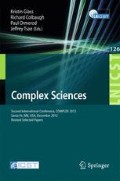Abstract
In many multi-agent systems (MAS), it is desirable that the agents can coordinate with one another on achieving socially optimal outcomes to increase the system level performance, and the traditional way of attaining this goal is to endow the agents with social rationality [7] - agents act as system utility maximizers. However, this is difficult to implement when we are facing open MAS domains such as peer-to-peer network and mobile ad-hoc networks, since we do not have control on all agents’ behaviors in such systems and each agent usually behaves individually rationally as an individual utility maximizer only. In this paper, we propose injecting a number of influencer agents to manipulate the behaviors of individually rational agents and investigate whether the individually rational agents can eventually be incentivized to coordinate on achieving socially optimal outcomes. We evaluate the effects of influencer agents in two common types of games: prisoner’s dilemma games and anti-coordination games. Simulation results show that a small proportion of influencer agents can significantly increase the average percentage of socially optimal outcomes attained in the system and better performance can be achieved compared with that of previous work.
Access this chapter
Tax calculation will be finalised at checkout
Purchases are for personal use only
Preview
Unable to display preview. Download preview PDF.
References
Bowling, M., Veloso, M.: Multiagent learning using a variable learning rate. Artificial Intelligence 136, 215–250 (2002)
Franks, H., Griffiths, N., Jhumka, A.: Manipulating convention emergence using influencer agents. In: AAMAS (2012)
Fudenberg, D., Levine, D.K.: The Theory of Learning in Games. MIT Press (1998)
Hales, D., Edmonds, B.: Evolving social rationality for mas using “tags”. In: AAMAS 2003, pp. 497–503. ACM Press (2003)
Hao, J.Y., Leung, H.F.: Learning to achieve social rationality using tag mechanism in repeated interactions. In: ICTAI 2011, pp. 148–155 (2011)
Hao, J., Leung, H.-F.: Learning to achieve socially optimal solutions in general-sum games. In: Anthony, P., Ishizuka, M., Lukose, D. (eds.) PRICAI 2012. LNCS, vol. 7458, pp. 88–99. Springer, Heidelberg (2012)
Hogg, L.M., Jennings, N.R.: Socially rational agents. In: Proceeding of AAAI Fall Symposium on Socially Intelligent Agents, pp. 61–63 (1997)
Matlock, M., Sen, S.: Effective tag mechanisms for evolving coordination. In: AAMAS 2007, pp. 1–8 (2007)
Matlock, M., Sen, S.: Effective tag mechanisms for evolving coperation. In: AAMAS 2009, pp. 489–496 (2009)
Sen, S., Airiau, S.: Emergence of norms through social learning. In: IJCAI 2007, pp. 1507–1512 (2007)
Steels, L.: A self-organizing spatial vocabulary. Artificial Life 2(3), 319–392 (1995)
Villatoro, D., Sen, S., Sabater-Mir, J.: Topology and memory effect on convention emergence. In: WI-IAT 2009, pp. 233–240 (2009)
Watkins, C.J.C.H., Dayan, P.D.: Q-learning. Machine Learning, 279–292 (1992)
Author information
Authors and Affiliations
Editor information
Editors and Affiliations
Rights and permissions
Copyright information
© 2013 ICST Institute for Computer Science, Social Informatics and Telecommunications Engineering
About this paper
Cite this paper
Hao, J., Leung, Hf. (2013). Achieving Social Optimality with Influencer Agents. In: Glass, K., Colbaugh, R., Ormerod, P., Tsao, J. (eds) Complex Sciences. Complex 2012. Lecture Notes of the Institute for Computer Sciences, Social Informatics and Telecommunications Engineering, vol 126. Springer, Cham. https://doi.org/10.1007/978-3-319-03473-7_12
Download citation
DOI: https://doi.org/10.1007/978-3-319-03473-7_12
Publisher Name: Springer, Cham
Print ISBN: 978-3-319-03472-0
Online ISBN: 978-3-319-03473-7
eBook Packages: Computer ScienceComputer Science (R0)

